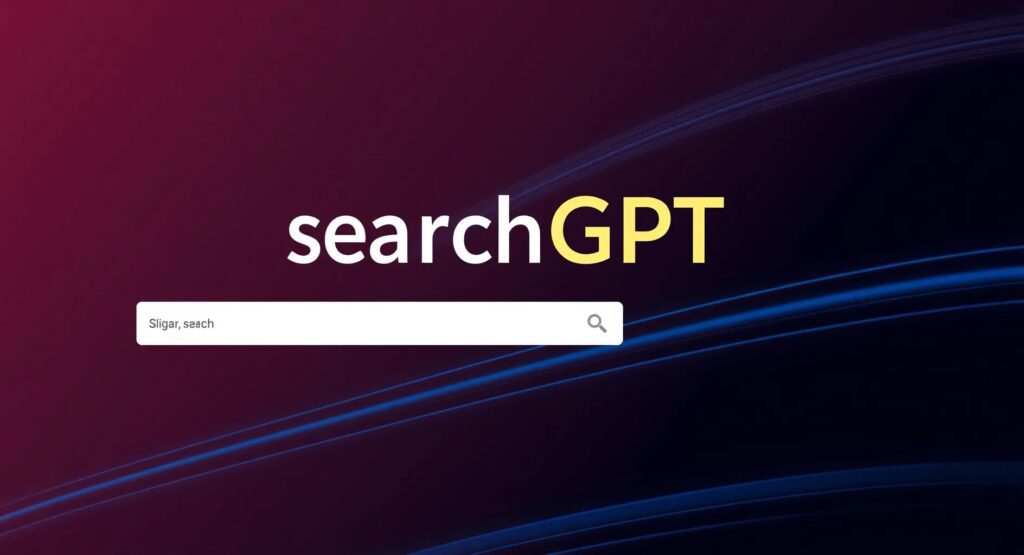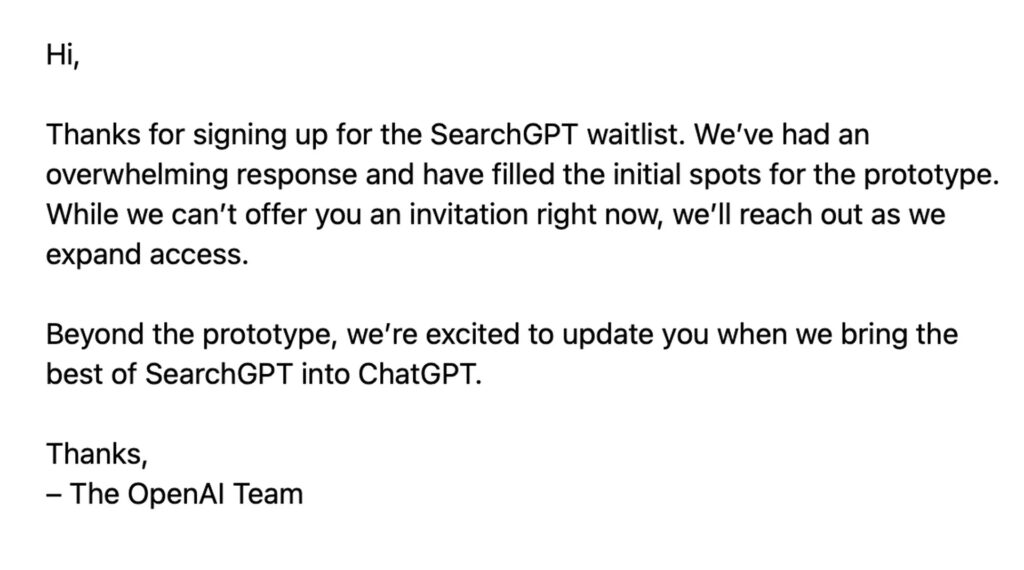
In a groundbreaking announcement, OpenAI has introduced SearchGPT, a revolutionary AI search engine designed to blend the conversational capabilities of ChatGPT with real-time information from the internet.
This innovative prototype aims to redefine how users interact with search engines, providing fast, accurate, and user-friendly responses.
What is SearchGPT?
SearchGPT is a cutting-edge search engine developed by OpenAI. It focuses exclusively on search functionality, distinct from training OpenAI’s generative AI models. This distinction ensures that websites can appear in search results even if they opt out of contributing to generative AI training.
The Fusion of AI and Real-Time Data
SearchGPT combines OpenAI’s state-of-the-art AI models with live data from the web, ensuring that users receive the most current and relevant information. Unlike traditional search engines that rely solely on indexed data, SearchGPT offers dynamic responses that reflect the latest available information.
Key Features of SearchGPT
To truly revolutionize search, SearchGPT must incorporate several key features:
- Natural Language Understanding (NLU): Leveraging GPT’s language models, SearchGPT can interpret user queries beyond simple keyword matching, understanding the nuances of human language.
- Contextual Search: By considering previous user interactions, SearchGPT can refine and personalize search results, making them more relevant and insightful.
- Summarization: Using GPT’s text generation capabilities, the tool can provide concise summaries of search results, saving users time and effort.
- Conversational Interface: A chat-like interface allows users to refine their queries naturally, creating a more intuitive and engaging search experience.
- Feedback Loop: Incorporating a feedback mechanism will enable continuous improvement of the search results, ensuring they stay relevant over time.
Real-Time Updates
SearchGPT continuously integrates new information from the web, ensuring responses are up-to-date. This real-time updating mechanism distinguishes SearchGPT from other AI search tools that might rely on static datasets. By accessing live data, SearchGPT ensures that users receive the most current and accurate information possible.
Conversational Interface
Leveraging the natural, conversational style of ChatGPT, users can interact with the search engine more intuitively, receiving answers that are easy to understand and contextually relevant. This feature aims to make the search process more user-friendly and less formal, enhancing the overall user experience.
Publisher Collaboration
OpenAI has partnered with various publishers to ensure proper content usage and attribution. This collaboration addresses ongoing concerns about AI models using and benefiting from content created by others without proper acknowledgment. Publishers will have more control over how their content is displayed and used within SearchGPT, fostering a more ethical and cooperative relationship between content creators and AI platforms.

OpenAI closed the waitlist for its “prototype” generative search product. This move indicates that the initial phase of testing has ended. Users who signed up received an email informing them that they were not selected to participate.
Keep an eye out for further updates from OpenAI as they continue to develop this exciting new technology.
Technical Architecture
Building SearchGPT requires a robust technical foundation, involving both frontend and backend components.
Frontend:
- User Interface (UI): Design an intuitive interface that feels familiar yet innovative. A clean, chat-based interaction model can make the search process more dynamic and user-friendly.
- Search Bar: The search bar should be enhanced with AI-generated suggestions, offering users hints and improving search accuracy.
Backend:
- Search Engine Integration: Integrate an existing search engine API (like Google or Bing) to fetch results, which GPT will then refine and enhance.
- GPT Model: OpenAI’s GPT models will be central to processing natural language queries and generating human-like responses.
- Query Refinement: Pre-processing user queries with GPT can ensure more accurate and contextually relevant search results.
- Post-Processing: After fetching results, use GPT to summarize and present them in a more digestible format.
Data Handling:
- Contextual Data Storage: Store user interaction history to enable personalized searches while ensuring data is handled securely and ethically.
- Security and Privacy: Implement strong security protocols to protect user data, complying with all relevant privacy laws.
Addressing AI Challenges
One of the significant challenges with AI-powered tools is the potential misuse of data. OpenAI has made it clear that SearchGPT’s data usage is distinct from its generative AI model training. This separation ensures that publishers’ content is not exploited for AI training purposes without their consent. Furthermore, SearchGPT features clear, in-line attributions and links, so users always know the source of the information they are receiving.
Future Integration with ChatGPT
While SearchGPT is currently in its prototype phase, OpenAI has ambitious plans to integrate its most successful features into ChatGPT. This future integration aims to create a more comprehensive AI assistant capable of handling an even broader range of queries with increased efficiency.
User Access and Feedback
Initially, SearchGPT will be available to a select group of users and publishers. OpenAI is actively seeking feedback to refine and enhance the tool further. Interested users can join a waitlist to gain early access and experience this cutting-edge technology firsthand.
New Management Tools for Publishers
The new tools offer several key features:
- Control Over Visibility: Publishers can decide how their content appears in SearchGPT results.
- Opt-Out Option: Sites can choose to opt-out of generative AI training but still be included in search results.
- Enhanced Local Information: OpenAI aims to improve searches related to local information and commerce, benefiting local businesses and consumers.
Why This Matters
These updates are crucial for several reasons:
- Publisher Autonomy: It empowers publishers to control their content without sacrificing visibility.
- Transparency: It enhances transparency between OpenAI and content creators.
- Local Focus: By improving local searches, OpenAI supports local businesses and enriches user experience.
How Publishers Can Benefit
Publishers can leverage these tools to:
- Tailor Their Presence: Customize how their content appears to SearchGPT users.
- Maintain Privacy: Opt-out of AI training without losing search visibility.
- Engage Local Audiences: Reach a more targeted audience through improved local search capabilities.
Steps for Publishers
Here’s how publishers can take advantage of these new tools:
- Sign Up: Register on the OpenAI platform.
- Set Preferences: Choose how their content is displayed and if they wish to opt out of AI training.
- Optimize Content: Ensure their content is optimized for both local and general searches.
Exploring the Benefits of SearchGPT
Enhancing Search Accuracy
The primary advantage of SearchGPT is its ability to provide accurate and timely information. Traditional search engines often fall short when it comes to delivering the latest updates or handling complex queries that require a nuanced understanding of context. By incorporating AI, SearchGPT can interpret queries more effectively and provide precise answers.
Improving User Experience
The conversational nature of SearchGPT enhances user experience by making interactions more natural and intuitive. Users no longer need to sift through multiple search results to find what they need. Instead, they receive direct, relevant answers that are easy to comprehend.
Supporting Publishers
OpenAI’s collaboration with publishers is a critical aspect of SearchGPT. By ensuring that content creators are credited and their work is used ethically, OpenAI addresses a major concern in the AI community. This approach not only benefits publishers but also enhances the reliability and credibility of the information provided by SearchGPT.
Addressing the Concerns of AI in Search
Ethical Use of Content
One of the key concerns with AI in search engines is the ethical use of content. With SearchGPT, OpenAI aims to address these issues by ensuring proper attribution and respecting publishers’ rights. This initiative is crucial in building trust between AI developers and content creators, fostering a more collaborative ecosystem.
Handling Misinformation
A significant challenge for AI models is handling misinformation. OpenAI is aware of this issue and has implemented measures to ensure that SearchGPT provides accurate information. By continuously updating its database and cross-referencing multiple sources, SearchGPT aims to minimize the spread of false information.
User Privacy
User privacy is another critical aspect that OpenAI is focusing on with SearchGPT. Ensuring that user data is handled responsibly and securely is paramount. OpenAI has implemented robust privacy measures to protect user information and maintain confidentiality.
The Future of AI-Powered Search
SearchGPT represents a significant step forward in AI technology and its application in everyday tools. As AI continues to evolve, its integration into search engines like SearchGPT promises to offer even more sophisticated and helpful functionalities. Users can look forward to a more seamless and intelligent search experience, setting a new standard for how we access information online.
OopsGPT: The Latest AI Mishap in Search Technology
What Went Wrong?
In its demonstration, SearchGPT inaccurately listed the dates for the Appalachian Summer Festival in Boone, North Carolina, suggesting events were happening when the festival had already concluded. This error is not isolated but part of a broader pattern of AI-powered tools providing “hallucinations“—false or misleading information generated by the AI
Looking Forward
OpenAI and other tech companies continue to iterate on these technologies, aiming to reduce errors and improve accuracy. However, the consistent pattern of issues highlights a fundamental challenge in AI development—balancing innovation with reliability and accuracy. The future of AI in search remains promising but will require substantial improvements and transparency to gain and maintain public trust.
Conclusion
OpenAI’s introduction of SearchGPT marks a pivotal moment in the evolution of search technology. By merging real-time data with advanced AI capabilities, SearchGPT is set to revolutionize the way we interact with search engines. As OpenAI continues to innovate and refine this tool, users can expect an increasingly powerful and user-friendly search experience. The future of search is here, and it is driven by the dynamic capabilities of SearchGPT.
For more detailed information, you can visit the official announcements and reports on Shacknews, MacRumors, and The Tech Portal.





